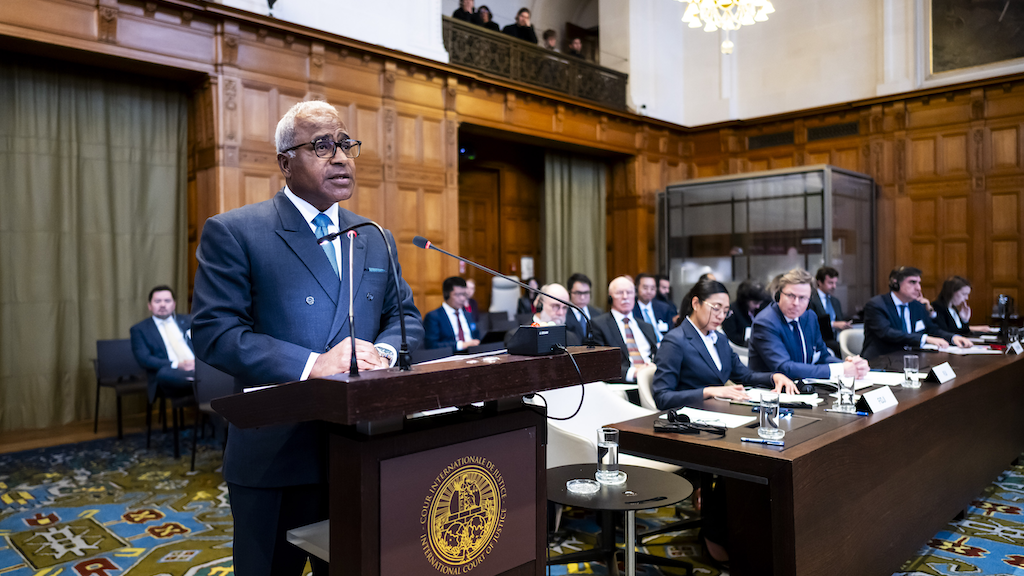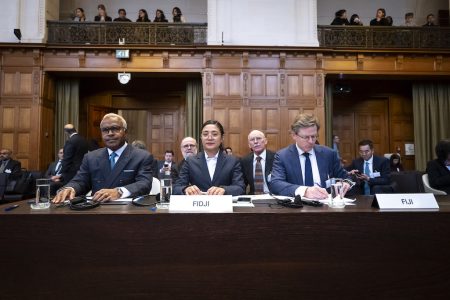Fiji urges World Court to acknowledge the rights of the Jewish people
On the 26th February 2024, the Republic of Fiji requested the International Court of Justice (ICJ) not to issue an Advisory Opinion about the “legal consequences of Israel’s prolonged occupation, settlement and annexation of the Palestinian territory occupied since 1967”.
These submissions were made on the last day of a six-day hearing at the ICJ in The Peace Palace in The Hague.
Fiji argued that the General Assembly’s request to the Court to issue an “Advisory opinion” is “one-sided”.
The UN General Assembly has asked the Court to issue an Advisory Opinion about the legal implications of Israel’s “policies and practices” in East Jerusalem, the West Bank and Gaza.
Fiji noted that there are two parties to the Israel-Palestine conflict. Fiji objects to the use of the UN system to prosecute only one of the parties. The Court, Fiji argued, must not ignore the rights of Israel, or the responsibilities of the Palestinian people.
In Fiji’s view, both Palestinians and Israel are bound to comply with the Oslo Accords, which require negotiations on all final status issues, including Jerusalem, settlements, security and borders. Israel and the PLO have also agreed not to take unilateral steps to avoid negotiations.
The legal team at The Hague Initiative for International Cooperation (thinc.) has been advising and assisting Fiji.
The Court is expected to make its decision within several months.
The UNGA Request for an Advisory Opinion.
In December 2022, a group of 87 UN member states adopted UN General Assembly resolution 77/247 requesting the ICJ to issue an advisory opinion on the following questions:
(a) What are the legal consequences arising from the ongoing violation by Israel of the right of the Palestinian people to self-determination, from its prolonged occupation, settlement and annexation of the Palestinian territory occupied since 1967, including measures aimed at altering the demographic composition, character and status of the Holy City of Jerusalem, and from its adoption of related discriminatory legislation and measures?
(b) How do the policies and practices of Israel referred to in paragraph 18(a) above affect the legal status of the occupation, and what are the legal consequences that arise for all States and the United Nations from this status?”
In 2023, 52 member states plus Palestine and three international organisations (League of Arab States, Organisation of Islamic Cooperation and African Union) submitted written statements and observations to the Court.
Many of them argued that the Court should issue an opinion that the occupation is illegal. They demand the “immediate”, “unconditional” and “total” end to the occupation – that is, the immediate and unconditional withdrawal of all Israeli military and civilians from the entirety of the West Bank, East Jerusalem, and Gaza.
The Court heard oral presentations from 19th – 26th February 2024.
Arab and Islamic States deny Israel’s legitimate existence.
Palestine, the League of Arab States and the Organisation of Islamic Cooperation have several main arguments:
- The whole territory of Mandate Palestine belongs to the Palestinians – i.e. everything between the Mediterranean Sea and the Jordan River.
- The re-establishment of the Jewish homeland was a breach of the right of the Palestinian people to self-determination.
- The Jewish state of Israel is a racist and illegitimate state.
- Israel’s occupation of East Jerusalem, West Bank and Gaza is illegal. Israel must end the occupation “totally, unconditionally, and immediately”.
- Under international law, other states are also required to ensure that Israel terminates its occupation immediately. They must impose boycotts and sanctions.
Several states object to this misuse of the ICJ Advisory Opinion mechanism.
Although most states argued that the Court should issue an Opinion condemning Israel, several states objected to the Court deciding on these issues. The UK, Hungary, Zambia, and Fiji argued that the Court should exercise its judicial discretion not to issue an opinion at all. The USA also argued that the Court should not take sides.
Summary of Fiji’s arguments.
Fiji affirms the important role of this Court as the highest judicial organ of the United Nations in resolving disputes between states and assisting UN organs in their activities.
In so doing, the Court must promote the purposes and principles of the UN Charter. According to Article 1 of the UN Charter, one of the main purposes of the United Nations is “to develop friendly relations among nations based on respect for the principle of equal rights and self-determination of peoples”.
According to Fiji, the only way to achieve truly sustainable peace between Israel and the Palestinian people – indeed between any neighbours – is through mutual respect.
As reflected in its Written Statement, Fiji considers it essential to maintain and uphold the legal framework agreed between the parties and sanctioned by the Security Council to resolve the Israel-Palestine dispute. That framework is founded on the understanding that Jews and Arabs must co-exist in a small piece of territory. This requires direct negotiations between the parties for an agreed outcome.
To answer the questions, the Court would need to carry out an independent judicial assessment of both the law and the facts, on virtually every aspect of the Israel-Palestine dispute, taking account of the relevant context. This is not an easy task. As Judge Higgins noted in her Separate Opinion in the Wall Advisory Opinion (2004): “[t]he law, history and politics of the Israel-Palestine dispute is immensely complex”. Further, “[c]ontext is usually important in legal determinations.”
In Fiji’s view, the Court has unfortunately been presented in these proceedings with a distinctly one-sided narrative. This fails to take account of the complexity of the dispute, and misrepresents the legal, historical, and political context.
In its Written Statement, Fiji provided several reasons why the Court should exercise its judicial discretion not to render an Advisory Opinion on the questions that have been posed by the General Assembly:
- First, the Request is a legal manoeuvre that circumvents the existing internationally sanctioned and legally-binding framework for resolution of the Israel-Palestine dispute;
- Second, to give an opinion in this case “would have the effect of circumventing the principle that a State is not obliged to allow its disputes to be submitted to judicial settlement without its consent”; and
- Third, due to the one-sided formulation of the questions posed in Resolution 77/247, the Court does not have before it the accurate and reliable information that it would need to render an opinion on the questions posed.







